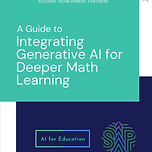
Classroom
Resources
How Educators Are Using Gemini for Teaching and Learning
Recommended Grades:
All Ages
This blog post highlights how educators are using Google's Gemini (formerly Bard) to enhance instruction and streamline planning. It features classroom examples from teachers using Gemini to differentiate lessons, generate ideas, support multilingual learners, and foster student curiosity, all aligned with ISTE’s AI standards.
Student AI Transparency Statements
Recommended Grades:
6–12
In this LinkedIn post, Professor Jason Gulya shares his approach to fostering responsible AI use among students through AI Transparency Statements. Students detail their AI usage across different stages of their work, rate their reliance using the AI Assessment Scale, and reflect on whether AI served as a co-pilot or co-thinker in their process. This practice encourages critical thinking about AI's role in learning and promotes academic integrity.
AI Literacy Mini Lessons
Recommended Grades:
3-5
Expose students in Grades 3-5 to artificial intelligence, originally created for Oregon STEM Week! Download our digital, ready-to-go lessons - featuring a week's worth of 15 minute mini lessons that introduce upper Elementary-aged learners to how AI is impacting us today, and what the future might hold. Our lessons feature Digital Defender Superheroes and cyber villains!
Common Sense AI Literacy Lessons
Recommended Grades:
All Ages
This collection from Common Sense Education offers quick, grab-and-go lessons designed to help students understand what AI is, how it works, and its potential benefits and risks. The lessons encourage critical thinking about the social and ethical impacts of AI, including its role in misinformation and media manipulation. Each lesson is designed to be completed in 20 minutes or less, making them easy to integrate into various classroom settings.
Checkology: News Literacy Modules
Recommended Grades:
6–12
Checkology by the News Literacy Project offers engaging, standards-aligned lessons that teach students how to evaluate news and media sources. While not AI-specific, its focus on misinformation, source credibility, and media manipulation directly supports AI-related media literacy goals. This makes it an excellent companion to AI literacy efforts, especially when exploring how generative AI can spread false or misleading content.
Guide to Integrating Generative AI for Deeper Literacy Learning
Recommended Grades:
All Ages
This guide offers practical strategies for integrating generative AI into literacy instruction while preserving student cognitive engagement. It helps educators identify when GenAI can support learning, where productive struggle matters, and how to avoid replacing critical thinking. Use cases span foundational skills, knowledge building, and writing.
The AI Assessment Scale
Recommended Grades:
All Ages
Developed by Leon Furze and colleagues, the AI Assessment Scale offers a practical rubric to evaluate how students are using AI in their work. It helps educators distinguish between surface-level use, collaborative support, and AI overuse or substitution. A useful tool for setting expectations and guiding classroom policy.
Digital Literacy & Well‑Being Curriculum
Recommended Grades:
6-8, K-5
A free K–8 curriculum that helps students navigate the digital world, covering AI literacy, cyberbullying, screen time, and online safety. With more than 140 new lessons, videos, and games, it offers engaging, low-prep activities that are research-based, classroom tested, and created with teachers.
CivAI Interactive AI Literacy Demos
Recommended Grades:
6–12
CivAI provides a collection of hands-on demos that allow students to experience the capabilities and implications of AI firsthand. From creating deepfakes to exploring AI-generated misinformation, these tools are designed to foster critical discussions around media literacy, ethics, and the societal impact of AI technologies.
AI for K-5
Recommended Grades:
K-5
These ready-to-go AI modules for K–5 educators were originally created for CS Week 2024 and are based on ISTE’s Hands-On Classroom AI Projects. Each module offers fun, meaningful opportunities for students to engage with cutting-edge technology, and includes a tutorial video with tips and tricks for easy implementation. With little to no prep required, these lessons make it easy to introduce young learners to AI and spark their curiosity about this continually evolving field.
AI Literacy Mini Lessons
Recommended Grades:
K-2
Expose students in Grades K-2 to artificial intelligence, originally created for Oregon STEM Week! Download our digital, ready-to-go lessons - featuring a week's worth of 15 minute mini lessons that introduce younger learners to AI and its impact on our everyday lives. Our lessons feature our fun robot, "Byte" and friends!
Computer Science and AI Foundations
Recommended Grades:
9-12
Code.org's Computer Science and AI Foundations (CSAIF) curriculum introduces high school students to core computer science principles and real-world applications of AI. Designed for learners with or without prior experience, the course covers topics like programming, data science, cybersecurity, and the ethical implications of emerging technologies. The modular structure allows educators to tailor the content to their students' needs, promoting critical thinking and problem-solving skills.
Stanford CRAFT: Classroom-Ready AI Resources for Teachers
Recommended Grades:
9-12
Stanford's CRAFT initiative offers a growing library of free, adaptable AI literacy lessons co-designed with high school educators. Covering subjects from science to language arts, these resources help students explore topics like algorithmic bias, AI-generated misinformation, and ethical design. Each lesson includes clear objectives, teacher guides, and student materials, making it easy to integrate AI concepts into existing curricula.
What are we going to do with Carl?
Recommended Grades:
6–12
This classroom scenario by Jason Gulya introduces “Carl,” a student using generative AI for assignments in ethically gray ways. It’s designed to spark discussion among educators and students about what responsible AI use looks like. Great for middle and high school, this exercise invites critical thinking about integrity, policy, and digital norms.
Code.org AI Courses
Recommended Grades:
3-5, 6–12
Code.org offers AI-focused modules for students in upper elementary and middle school, introducing core concepts through interactive, unplugged, and coding activities. Courses like “AI for Oceans” help learners explore how data shapes decision-making. These resources are classroom-ready and aligned with digital literacy and CS standards.




















